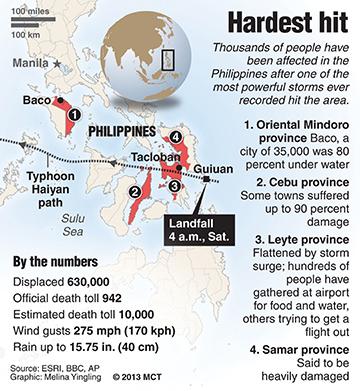A few weeks ago, I was sitting in class, waiting for it to start. I was minding my own business when I noticed two girls around my age talking. I wasn’t really listening to what they were saying, until I heard one of them say, “Wait, so, who is Ben Ghazi? Some political person, right?” At that moment, I realized that, unfortunately, my generation is painfully and embarrassingly oblivious to what’s going on in the world around them.
I decided to do my own personal investigation on young adults’ knowledge of major world issues, along with their levels of empathy. And no, I don’t consider the new PlayStation 4 a major world issue.
I casually asked three friends about what they thought of the rescue efforts in the wake of Typhoon Haiyan. One friend gave me a blank stare, another said, “It sucks,” then changed the subject, and the last gave me a lengthy but confusing answer, which led me to believe he didn’t actually have a real opinion to begin with.
As most of you (should) know, the Philippines suffered a devastating natural disaster last week in the form of Typhoon Haiyan. Though the exact amount of damages seems to be endless, it’s estimated that more than 3,500 have died, and hundreds of thousands of people are left homeless, hungry and lost. As a global community, we are great at coming together in the wake of disturbances in our lives, especially natural disasters. This is evident by Hurricane Katrina in 2005, the 2010 Haiti earthquake, the 2011 tsunami in Japan and countless others. Organizations, such as the United Nations, and the American Red Cross, are quick to provide relief efforts for the people whose lives are destroyed in the blink of an eye. There’s no doubt about that.
Essentially, American young adults have two problems. The first is we don’t know what’s going on in the world around us. The second is most of those who do know don’t particularly care because it doesn’t directly affect them. We are way too unfazed by things that are actually important. If anything, we show moderate interest as soon as it happens, but that interest fades just as quickly as it came.
My observations mainly come from social media. Oh, how good we are at social media. We can tweet, like, pin and do everything else under the sun, but unless it’s consistently used in a way that spreads mass awareness of something important, it doesn’t do anyone any good. It’s so easy to say, “My thoughts and prayers are with … etc.” That’s always a nice gesture, but our awareness about the issue seems to stop there. The next post might be something about a twerking cat. And just like that, we forget about the people in the world who need us most. That has to change. Instead of stopping after that initial post, keep at it. Don’t let people forget. Make people want to care.
I understand we are all busy with our own lives, we have school, jobs, families, significant others, clubs and all that jazz. No one can fault us for being preoccupied with that. I’m also not saying young people should feel the need to donate money they can’t afford to give. But imagine yourself in someone else’s shoes. Imagine you are someone who has just lost everything and you don’t have a penny to your name. You would want people to pay attention to you and to care enough to help in any way they can, wouldn’t you? Just because something terrible isn’t directly impacting us doesn’t mean we should care about it any less.
With all the things happening in the world, both domestically and abroad, we need to arm ourselves with information. We can’t afford to be oblivious to our surroundings in such a crucial time. Watch the news, read articles online, pick up a newspaper (preferably The Aztec), and develop your own opinion and voice. What you choose to do after that is ultimately up to you.
Courtesy of Thinkstock







